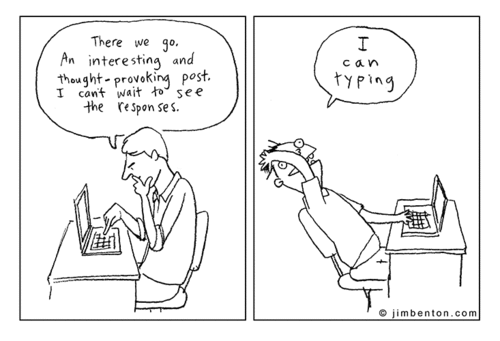
Recently, I had someone ask me about comments on Kill Screen. Specifically, he wanted to know why we had them at all since, as he astutely noticed, no one reads comments and nothing good seems to happen there. Slate goes as far as to sequester commenters entirely in a hotbox they call “The Fray.” We’ve been mostly fortuntate to have some really ace commenters but, sure enough, there are some terrible people out there.
Well, researchers at George Mason University have explained one of the Internet’s great mysteries. Why are commenters so mean?
– – –
The study was targeting climate change research, specifically, and the researchers asked more than 1,000 participants to read the same blog post. The text, again, was exactly the same, but the comments varied from thoughtful to utterly vile. The results were perhaps predicatably. Rather than informing debate, early comments influenced it. Ruder comments invited mean nasty remarks; more measured ones created a more civil atmosphere.
Mother Jones points to something called “motivated reasoning” in psychology which notes that people feel first, and then think second. (There’s actually a pretty great Radiolab about the difference between our thinking brain and our feeling brain.) This is a phenomenon known all too well to the world of games. I am, of course, thinking of last year’s disastrous “Change the Mass Effect ending because art is about what I want, not the creators’ intent” debacle. As the complaints grew, the collective mood turned sour and eventually BioWare, sadly, conceded and gave the frothing masses its new ending. (Is it any wonder that the studio’s co-founders quit?)
The George Mason research echoes the results of Columbia University professor Duncan Watts’ music study and the his theory of “cumulative advantage.” Watts created a similar scenario, sharing the same set of music with a sample of listeners. What they voted as their favorite was not a reflection of some collective sense of taste or critical thought, but what had emerged as popular first. He writes:
The common-sense view, however, makes a big assumption: that when people make decisions about what they like, they do so independently of one another. But people almost never make decisions independently — in part because the world abounds with so many choices that we have little hope of ever finding what we want on our own; in part because we are never really sure what we want anyway; and in part because what we often want is not so much to experience the “best” of everything as it is to experience the same things as other people and thereby also experience the benefits of sharing.
Ultimately, this seems to suggest that we can’t help ourselves. Bad begets bad etc. Maybe there is no hope for commenters if they can’t defy their own brain chemistry. But I’d like to believe we can!